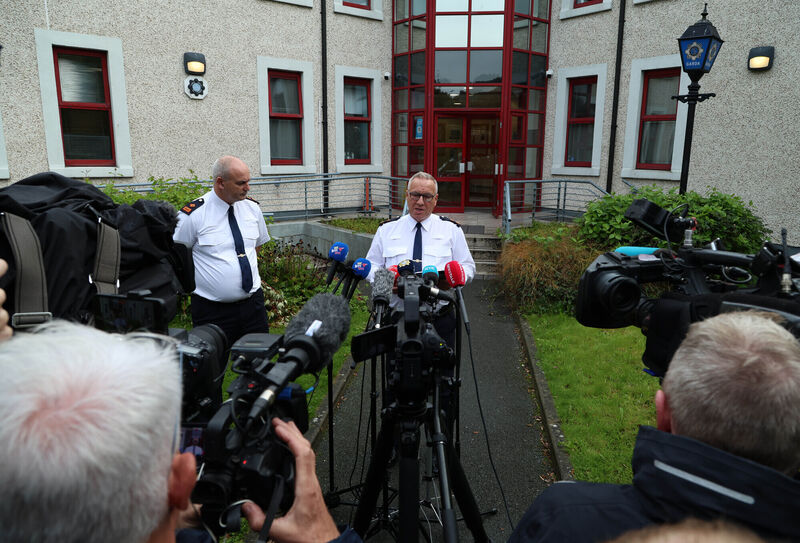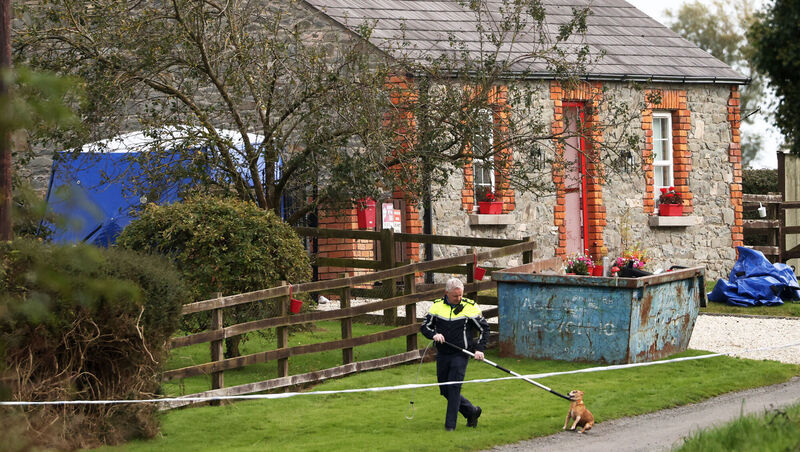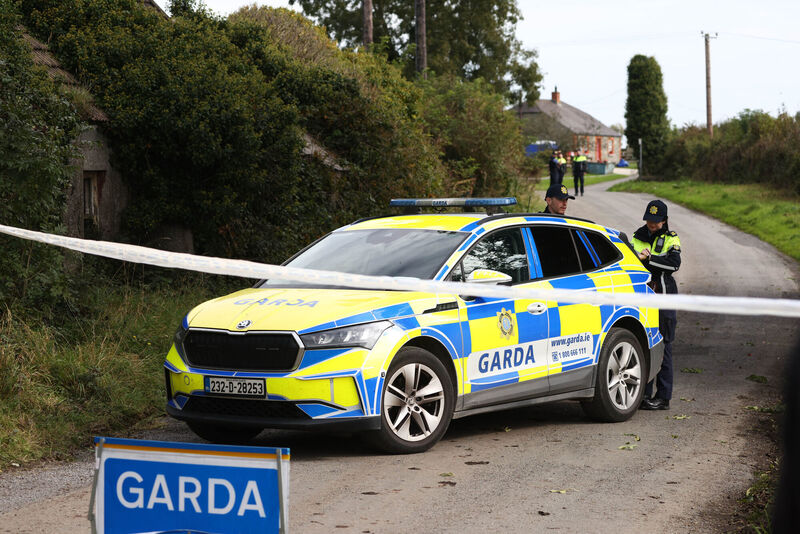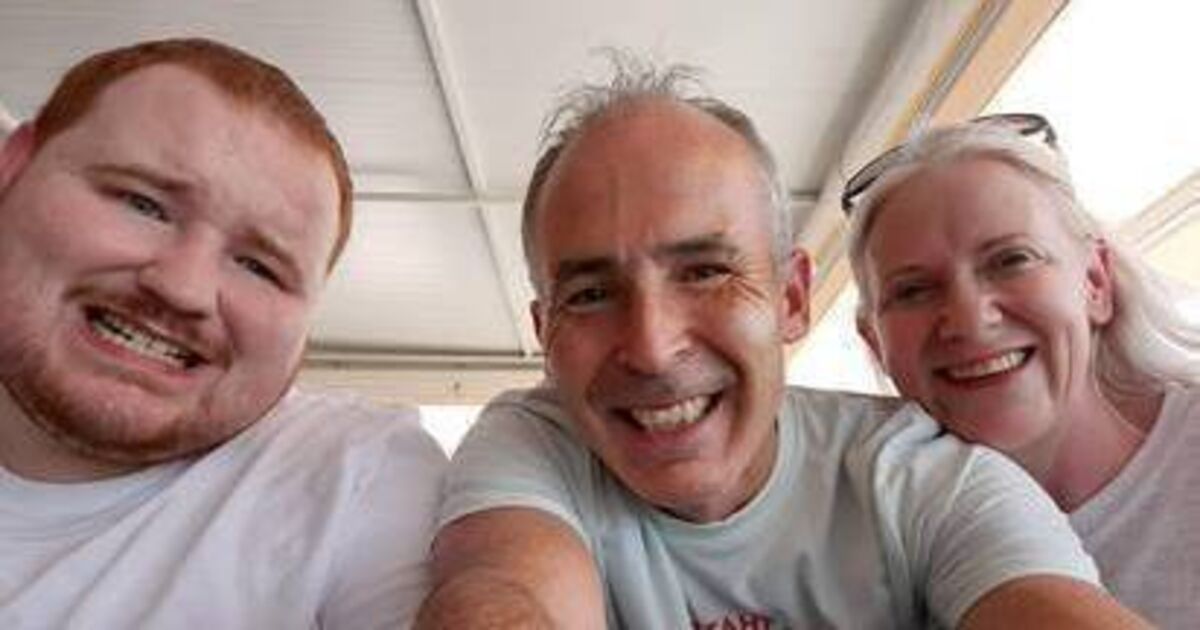Three members of the same family found dead in Co Louth were an “integral part of their local community”, gardaí have said.
Gardaí questioning a man for the suspected killing of Louise O’Connor, 56, and Mark O’Connor, 54, and their son Evan, aged 27, are examining his medical history and recent behaviour to try and piece together what might have led to the deaths.
A number of items, including possible weapons, were removed from a house where the three bodies — two men and one woman — were found on Monday morning.
The deceased have been named locally as Louise O’Connor, 56, and Mark O’Connor, 54, and their son Evan, aged 27.
It is not clear if all the victims were stabbed, if they died from blunt force trauma, or if it was the same cause of death for all three people. No firearms were used.
Sources said it must have been a “sustained and determined” attack in order to kill three adults.
The suspected killings are believed to have taken place at, or after, breakfast time, although it is yet to be determined what preceded the violence.
Gardaí have stressed that it is very early in their investigation, pointing out that officers first arrived at the scene just before 10am.
“It too soon to say what’s the cause or motivation behind this,” one source said. “Hopefully we will get something from the interviews [of the suspect].”
Superintendent Andrew Watters described the O’Connor family as “very well-known and respected… good neighbours and an integral part of their local community in Drumgowna and the wider area of Louth and Monaghan.”
He said gardaí are continuing to investigate all of the circumstances of the “family tragedy.”
“A Family Liaison Officer has been assigned to support the O’Connor family. An Garda Síochána will keep the family informed of the ongoing investigation and support them as they come to terms with this tragedy,” he said, while appealing for privacy for the family at this time.
 Superintendent Andrew Watters pictured this morning speaking at Drogheda Garda station during an appeal for information about yesterday’s triple killing. Picture: Colin Keegan, Collins, Dublin.
Superintendent Andrew Watters pictured this morning speaking at Drogheda Garda station during an appeal for information about yesterday’s triple killing. Picture: Colin Keegan, Collins, Dublin.
Superintendent Watters said gardaí “will also closely support the local community in the Drumgowna area over the coming days as they come to terms with the violent death of their neighbours.”
He said autopsy examinations on the three victims would start on Tuesday.
He confirmed that a man in his 30s was arrested nearby shortly after Gardaí arrived at the scene. The man is being detained at a Garda station in Co Louth under Section 4 of the Criminal Justice Act, 1984.
“An Garda Síochána is not looking for any other person in connection with this homicide investigation,” he added.
Gardaí point out that three separate autopsies have to take place, a process that will begin on Tuesday.
The bodies were only removed from the scene just before 6pm on Monday. A detailed forensic and technical examination is underway at the property, an endeavour that is also likely to take a few days.
The remote house, a pretty cottage in a well-maintained site, is in a remote townland of Drumgowna, near Tallanstown, on the western side of the county. The family is well-known in the area.
Gardaí have said they are not looking for anyone else. Sources have said the case is “very raw” and “tragic”.
 The remote house, a pretty cottage in a well-maintained site, is in a remote townland of Drumgowna, near Tallanstown, on the western side of the county. Picture: Peter Morrison/PA
The remote house, a pretty cottage in a well-maintained site, is in a remote townland of Drumgowna, near Tallanstown, on the western side of the county. Picture: Peter Morrison/PA
The suspect is understood to have a diagnosis of a serious psychiatric illness and was taking prescribed medication.
One line being examined by gardaí is whether or not he was taking his medication in recent days — and, if not, could that possibly be a factor.
It is understood that blood samples may be taken to determine what substances are in his system, not only the medication but also any other substances that could interact with it. Inquiries are underway with his GP and the local pharmacist.
Sources stress this is just one line of inquiry that may, or may not, be relevant. Sources have also said that family members would be a source of information, but it appears there may not be any other family members that could assist.
Gardaí will try to identify, through neighbours and other local people, who the suspect may have interacted with recently.
Mobile phones and other digital devices will also be examined to see if they can assist, as well as other letters or documents.
It is understood that gardaí called a doctor after the suspect was brought into custody.
A garda statement said: “Gardaí continue to investigate all the circumstances of a fatal incident at a residential property in Drumgowna, Tallanstown, Co Louth, this morning, Monday September 29, 2025.”
 Gardai at the scene in Tallanstown, Co. Louth. Picture: Peter Morrison/PA Wire
Gardai at the scene in Tallanstown, Co. Louth. Picture: Peter Morrison/PA Wire
It said gardaí responded to a call to attend the residential property shortly before 10am.
“Three people — a male and a female in their 50s and a male in his 20s were found deceased at the scene,” the statement said.
“A male, aged in his 30s, has been arrested and is currently detained at a station in the garda northwestern region under Section 4 of the Criminal Justice Act, 1984.”
This allows for up to 24 hours in custody, excluding any medical consultations or sleep breaks.
The statement said the scene was the subject of an ongoing forensic examination by the Garda National Technical Bureau and that the Offices of the Coroner and the State Pathologist have been notified.
“The remains of the deceased have been removed from the scene to Our Lady of Lourdes Hospital, Drogheda, where post-mortem examinations will be conducted tomorrow,” it said.
The investigation is being conducted from an incident room at Ardee Garda Station and a senior investigating officer has been appointed.
A family liaison officer has been appointed to support and keep the family of the deceased informed.
An Garda Síochána appeals to any person with any information on this incident to contact the Garda Investigation Team by calling Drogheda Garda Station at 041 987 4200, the Garda Confidential Line on 1800 666 111, or any Garda Station.
